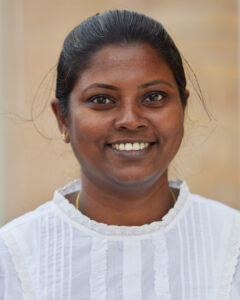Brijitta Joseph Boniface’s Interview
Starting date: 01/02/2023
Nationality : Indian
Implementing Partner : Forschungszentrum Jülich
Main supervisor: Dr. Aurel Radulescu

Few words about you and your research project
I am a GNeuS fellow in Forschungszentrum Jülich, Jülich Centre for Neutron Science (JCNS), at Heinz Maier-Leibnitz Zentrum (MLZ), Garching, Germany in the group of Dr. Aurel Radulescu. In my tenure, I will be investigating the dynamics and structure formation in bioflocculation processes in a wastewater treatment plant. Biological flocculation is a complex process. To understand this, I will develop a model colloid system containing latex/microgel particles, study their interaction with an industrial flocculating agent, and determine the fractal dimension of the so-formed aggregates. The aggregate’s viscosity and yield stress will be studied under-flow and stopped-flow conditions using the rheo-SANS facility at the KWS-2 SANS beamline. Finally, the model system will be compared to the microscopic, scattering, and rheological data obtained for the actual wastewater-flocculant system.
For my studies I will rely on tools based on scattering techniques and microscopy, in particular static and dynamic light scattering (SLS & DLS), small angle x-ray scattering (SAXS), small angle neutron scattering (SANS) and confocal laser scanning microscopy (CLSM).
I will be working with Dr. Christian Lang during my non-academic secondment at VTA Technologie GmbH, Austria. VTA Group operates worldwide and through its fine line of products, an estimate of wastewater produced by 250 million people is cleaned every day.
Connect me through LinkedIn.
What is your background? How have you heard about GNeuS?
I received a PhD in Chemistry, the doctoral research was carried out at Indira Gandhi Centre for Atomic Research, Kalpakkam, Tamil Nadu, India under the supervision of Prof. BVR Tata and the degree was awarded by Pondicherry Central University, Pondicherry, India. My doctoral thesis was on the phase behaviour of thermo-responsive microgels studied using light scattering techniques and confocal microscopy. I spent two years as a postdoc in the group of Prof. Peter Schurtenberger at Lund University, Sweden; here, I was investigating the structure of highly crosslinked microgels in dilute to overcrowded conditions using scattering techniques. I am employed as a Scientist in the Centre for Nanoscience and Nanotechnology at Sathyabama Institute of Science and Technology, Chennai, Tamil Nadu, India and currently serving a sabbatical for the GNeuS Program.
I came to know of the MSCA GNeuS program through the websites of Cordis Europa and Lens Initiative and later through Dr. Aurel Radulescu.
Why did you apply specifically on GNeuS?
During my stay in the group of Prof. Peter Schurtenberger, I had the opportunity to use the SANS beamlines in D11 at ILL, Grenoble, France, KWS-2 at MLZ, Garching, Germany and the cSAXS beamline at PSI, Switzerland. Though the sample preparation process for the SANS zero-average contrast is tedious and the beamtimes are tiresome, I particularly enjoyed the data fitting and how neutron scattering sheds information on particle size and shape. It is this experience with neutrons that drove me to apply for the GNeuS call.
Moreover, I liked the objectives of the Marie Skłodowska-Curie Actions Cofund as it promotes sustainable training and international, interdisciplinary, and inter-sectoral mobility. The GNeuS program has a well-framed personal career development plan offering benefits such as developing soft skills, entrepreneurship skills, the opportunity to teach and supervise master and doctoral students, scientific training in the form of schools and workshops, and the opportunity to network with peers at conferences, seminars, and meetings.
The proposal I submitted to GNeuS was on the “Dynamics and structure formation in bioflocculation processes” and it was particularly appealing due to its connection with water treatment and the opportunity to work in VTA Technologie GmbH, a market leader in both domestic and industrial wastewater treatment.
What impacts do you expect from the GNeuS fellowship?
The objective of the GNeuS programme is to build the next generation of neutron scientists and with the training and exposure I receive during my fellowship, I hope to establish myself as a scientist harnessing the power of neutrons to characterize soft matter. Within the GNeuS program, I intend to establish new collaborations and expand my research network. Getting trained in neutron scattering will boost my ability to write quality proposals for beamline usage in large facilities such as KWS-2, ILL, PSI, etc.
I will also benefit from my non-academic secondment, which will help me understand quality control and the scalability of materials from lab to industrial mass production.
